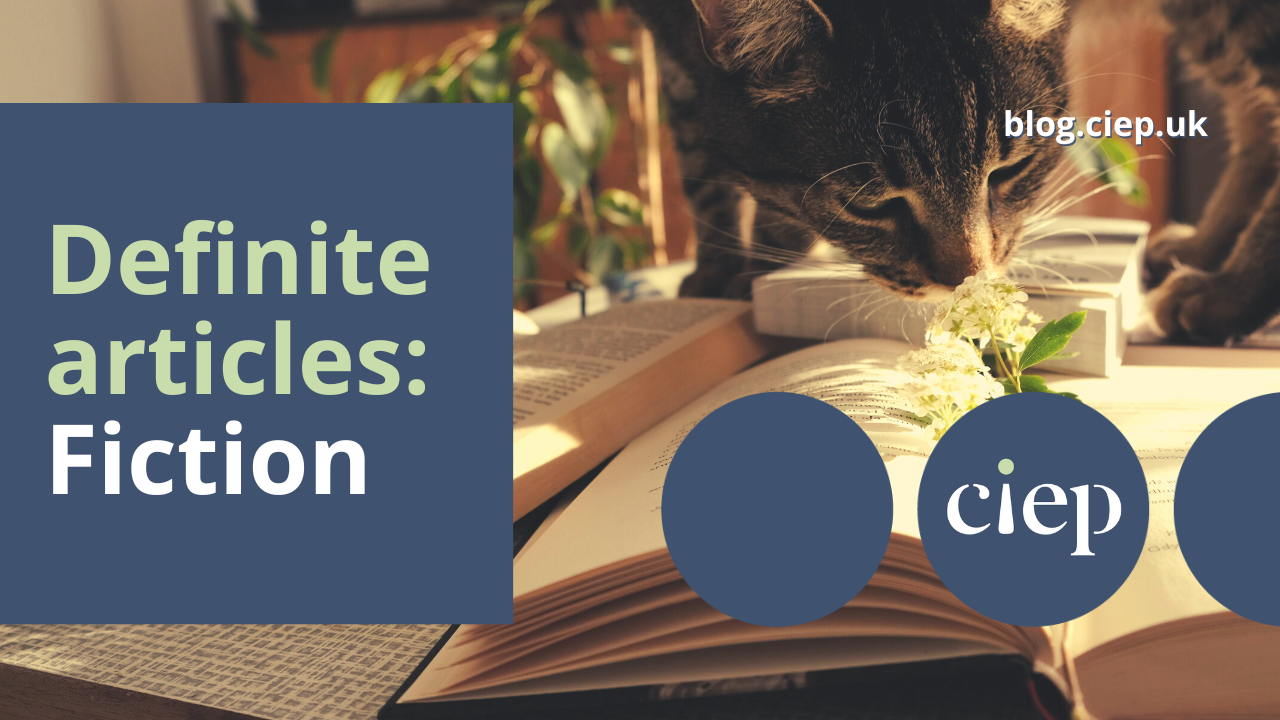Welcome to ‘Definite articles’, our pick of recent editing-related internet content, most of which are definitely articles. This time, our theme is fiction. If you want to view the CIEP’s own recent content, head straight for CIEP social media round-up: June and July 2022.
In this blog post:
- The language of fiction
- Dialogue and character
- Plot, story and scenes
- The business of fiction
- Fiction past
- And the prize goes to …
The language of fiction
Words: they’re what books are made of. If you’re stuck for one, the internet’s a good place to start in finding what you need. During May, June and July, Cambridge Dictionaries published a number of useful articles for any fiction writer or editor groping towards the right words, including how to describe textures, breathing, people you like and admire, looking for information and then finding it, enjoying yourself, and animal noises such as howling, mewing and snorting, and grunting, lowing and bleating.
The Merriam-Webster dictionary posted its ‘Great big list of beautiful and useless words, part 1’, with links to Parts 2 and 3. Each list contained 50 words that were obscure and attractive in equal measure. Our favourite was peristeronic: suggestive of pigeons. (So useful.)
Dialogue and character
A major element of fiction is dialogue. In July, Carol Saller for The Chicago Manual of Style (CMOS) explored interjections, because:
Not all fictional characters are meant to be smooth-tongued and lyrical in their speech. Rather, just like us, they sometimes mumble or stumble. Giving a character flawed speech is a way to make dialogue more realistic. And this very human kind of talking often involves the use of interjections.
Continuing the theme of writing authentic dialogue, Edwin L Battistella described how we’re likely to deal with pronouns and joint possession in normal speech – for example ‘Paul and my home’ or ‘Kace and I’s text’. Battistella set out the grammar rules but explained why we often break them when chatting. This practical approach may explain why the article attracted so many likes on the CIEP’s social media platforms.
When we write beyond our own experience it’s crucial to conduct research – for example to interview people with different lives to ours, and to learn about variations and dialects in Englishes and other languages. The internet can offer some pointers on the latter, although this should only be the first step. In June, The Guardian focused on Multicultural London English (MLE), which is rapidly growing in the UK.
In ‘How (and how not!) to write queer characters: a primer‘ on Jane Friedman’s website, Susan DeFreitas gave advice about how to avoid writing stereotyped characters (for example the ‘Magic Gay Bestie’) and biased plot devices (for example when a gay character is killed off early), and suggested best practices for writing queer characters (for example, ‘Don’t make them the sole representative’).
ALLi (the Alliance of Independent Authors) shared Sacha Black’s podcast on levelling up your side characters, a Self-Publishing Conference Highlight, in audio and transcript. Black’s talk featured Mr Wheezy, the penguin from Toy Story (remember him?), alongside many minor characters you might have temporarily forgotten who are important for plot and theme.
Another useful article about characterisation on Jane Friedman’s site was Heather Davis’s ‘7 questions to design a better arc of change for your protagonist’. We posted this across our social media platforms in mid-July to wide approval. One follower commented, ‘this is a great article!’
Plot, story and scenes
In fact, there was a run of great articles from Jane Friedman’s site this summer. Many of them considered plot, story and scenes, from ‘The vital difference between plot and story – and why you need both‘ by Heather Davis to ‘The building blocks of scene’, ‘Moving between scenes with summary and spacers’ and ‘Good scenes require specifics’ by Sharon Oard Warner.
Back on the CMOS Shop Talk blog, Carol Saller considered ‘What makes a chapter of a novel?’ including purpose, length and endings.
The business of fiction
The profile of self-publishing was high this summer. Radio 4’s Money Box devoted a programme to self-publishing, and at the beginning of August The Guardian published a step-by-step guide to getting your book published, which mentioned the CIEP’s suggested minimum rates for editors and proofreaders to help with budgeting.
Talking about the CIEP, the AFEPI published a version of Averill Buchanan’s CIEP blog on fiction book production. Alongside this, you could read ALLi’s ‘Ultimate guide to formatting your print book’, posted in May.
In addition, there were articles on book blurbs, creating a copyright page and how to make a great author website, as well as ALLi Twitter chat on common book marketing failures. All useful stuff.
Fiction past
Reading fiction is an important part of writing and editing it. Recent online content on past fictional works included ‘A literary history of modernism’, which starts with psychologist and philosopher William James’s ‘stream of consciousness’, a quiz on Mary Shelley, five little-known facts about Dracula, fictional worlds you might belong in (one follower commented: ‘I ended up in Mrs Dalloway’s world. Need to dig out the cloche hat’) and, after we’ve finished reading, ‘How to survive the post-book blues’.
As the summer got hotter, the OUP created a playlist inspired by Oxford World’s Classics, so you didn’t even have to go to the bother of reading to be inspired. It’s on Spotify, if you want to hunt it out.
And the prize goes to …
In June, writers and others in the publishing industry expressed dismay that the Costa (formerly Whitbread) book awards were being scrapped after 50 years.
In July, a writer responded in the most positive way to the ending of another award. When it was announced that the Blue Peter Book Award had finished, Elle McNicoll, a former winner, started her own prize for UK books with a disability focus. She specified that winning books had to be ‘about JOY more than MISERY’.
Another book award led to an unexpected result this summer: it shone a spotlight on plagiarism in fiction. An examination of John Hughes’s novel The Dogs, longlisted for the Miles Franklin Literary Award, revealed that parts of the book displayed similarities to parts of major works by Svetlana Alexievich, Leo Tolstoy, Erich Maria Remarque, F Scott Fitzgerald and others. Author John Purcell wrote an account of the saga, ending with, ‘Needless to say, all of Hughes’ other work is now being placed under the microscope. This is far from over. Oh goodie.’
Fortunately, other prizes continued unbothered. At the end of July, along with others, Lit Hub announced the 2022 Booker Prize longlist.
Another prize that has survived the summer is the Bulwer Lytton Fiction Contest. Sir Edward George Bulwer-Lytton was the nineteenth-century author of the famous opening line ‘It was a dark and stormy night’, and entrants to the contest are tasked with writing ‘an atrocious opening sentence to the worst novel never written’. The 2021 Grand Prize Winner was Stu Duval of Auckland, whose opening started: ‘A lecherous sunrise flaunted itself over a flatulent sea, ripping the obsidian bodice of night asunder with its rapacious fingers of gold’ … you get the general idea. Keep checking www.bulwer-lytton.com for the news on this year’s winner, which will be widely proclaimed anon. While we wait with breath baited, enjoy Amber Sparks on Twitter (@ambernoelle), who got right into the Victorian vibe:
Normal people: I met this guy, he was average
Victorian writers: He was, in the way of most men, possessed of a rudimentary intelligence, his countenance ordinary, his bearing mild, with some weakness about the shoulders, his hair the color of ash; he spoke of the weather
What more is there to be said? Hand Amber the Bulwer Lytton crown, someone.
Online fiction resources
We hope you enjoyed this edition of ‘Definite articles’. Here are the resources we featured for reading, writing, editing and publishing fiction.
Alliance of Independent Authors (ALLi): selfpublishingadvice.org
Association of Freelance Editors, Proofreaders & Indexers of Ireland (AFEPI) blog: afepi-ireland.com/blog
Cambridge Dictionaries blog: dictionaryblog.cambridge.org
Chicago Manual of Style (CMOS) Shop Talk: cmosshoptalk.com
Jane Friedman: janefriedman.com
Literary Hub (Lit Hub): lithub.com
Merriam-Webster Words at Play: merriam-webster.com/words-at-play
Oxford University Press blog: blog.oup.com
Penguin: penguin.co.uk
From the CIEP
We recently shared these CIEP fiction resources on our social media platforms.
Cashmore, Stephen. ‘Editing dialogue’. Members-only fact sheet. ciep.uk/resources/factsheets/#ED.
Donaldson, Sara. ‘Common problems encountered in fiction editing’. Blog article. blog.ciep.uk/fiction-editing-common-problems.
Introduction to Fiction Editing. Course. ciep.uk/training/choose-a-course/introduction-to-fiction-editing.
O’Grady, Carrie. ‘Sharing is caring: collaboration among freelance fiction editors’. Blog article. blog.ciep.uk/collaboration-among-freelance-fiction-editors.
Taylor, Nick. ‘Editing LGBTQ+ language with sensitivity’. Members-only fact sheet. ciep.uk/resources/factsheets/#ELL.
Trail, Katherine. ‘A look at editing romance novels’. Blog article. ciep.uk/romance-novels-editing.
You can find us online on Facebook, Twitter and LinkedIn.
 About the CIEP
About the CIEP
The Chartered Institute of Editing and Proofreading (CIEP) is a non-profit body promoting excellence in English language editing. We set and demonstrate editorial standards, and we are a community, training hub and support network for editorial professionals – the people who work to make text accurate, clear and fit for purpose.
Find out more about:
Photo credits: cat and books by Klaudia Ekert on Pexels, trophy by Giorgio Trovato on Unsplash.
Posted by Harriet Power, CIEP information commissioning editor.
The views expressed here do not necessarily reflect those of the CIEP.


